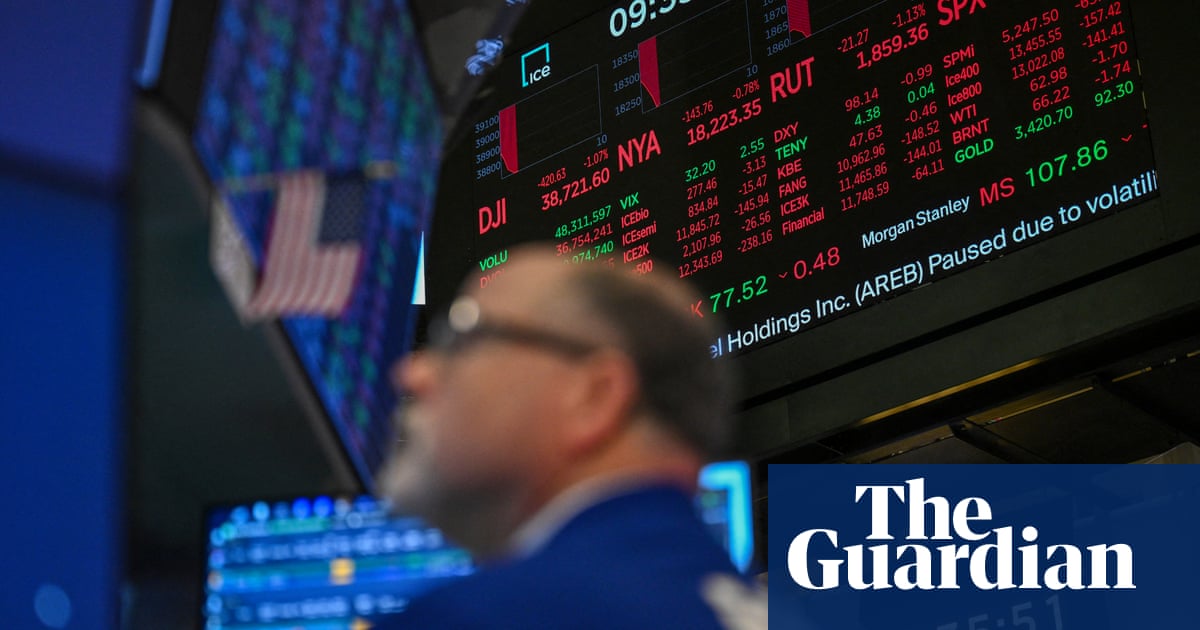US stock markets started falling again on Monday morning asDonald Trumpcontinued attacks against the Federal Reserve chair,Jerome Powell, who the US president called “a major loser” for not lowering interest rates.
“There can be a slowing of the economy unless Mr. Too Late, a major loser, lowers interest rates, NOW,” Trump wrote on social media.
In recent days, Trump has amped up attacks against the Fed chair,pushingPowell to lower interest rates to offset the inflationary impacts of thenew tariffs.
Trump is pressuring the Fed to cut rates, likely to appease the stock market, which plummeted after he announced his newest slate of tariffs. But Wall Street isn’t taking the bait and appears to be reacting in opposition to Trump’s attacks against Powell.
On Monday morning the Dow was down 1,000 points, 2.8%, while the tech-heavy Nasdaq Composite was over 3% down and the S&P 500 fell 2.9%. Former tech stocks favorites Tesla and Nvidia were both down over 5% on Monday, while the value of the dollar fell to multiyear lows against most major currencies.
Stock markets had recovered the losses they endured after Trump rolled out his“liberation day” tariffsproposals, which would have imposed huge levies on all of the US’s trading partners. But almost all the gains made in the stock market following Trump’s announcement of a90-day pauseof his so-called reciprocal tariffs have been erased amid these new jabs against Powell.
Powell, known to be extremely measured in his public remarks, has in recent weeks spoken out about Trump’s tariffs and warned that they may lead to a “challenging scenario” for the Fed, implying that the Fed has no plans to cut interest rates anytime soon.
“Tariffs are highly likely to generate at least a temporary rise in inflation. The inflation effects could also be more persistent,” Powelltold reporters on 16 April.
US inflation peaked at 9% in June 2022 but has slowly come down over the last few years, largely due to the Fed’s careful adjustment of interest rates. The Fed has set its inflation rate target at 2%.
Powell often refers to the central bank’s “dual mandate” – to keep inflation in check while maximising employment. Higher interest rates can bring down prices, though it can come at the risk of higher unemployment. Over the last few years, the Fed has been able to bring down inflation while keeping the unemployment rate relatively low, around 4%. Last month, inflationcooledto 2.4%, though the most recent government figures do not account for the Trump tariffs.
The Fed has long been treated as a nonpartisan, nonpolitical federal agency, though Trump has recently floated the idea of terminating Powell, whose term is up in May 2026. “Powell’s termination cannot come fast enough!” Trump wrote on social media last week.
Such a move would be unprecedented and would likely put Wall Street into a further tailspin. In an interview with CNBC, Krishna Guha, the vice-chair of Evercore ISI, an equity research firm, said that there would be a “severe reaction” from markets if Trump fires Powell.
“I can’t believe that’s what the administration is trying to achieve,” Guha said.
Sign up toBusiness Today
Get set for the working day – we'll point you to all the business news and analysis you need every morning
after newsletter promotion
It’s also unclear whether Trump has theauthorityto remove Powell from his post. The supreme court is currently hearing a case that could give Trump more power to fire federal officials before their terms are up, though it’s unclear whether that could reach the Fed.
Last week, Powell emphasized the importance of the Fed’s independence from political forces.
“Our independence is a matter of law,” Powell said. “We serve very long terms, seemingly endless terms, so we’re protected by the law.”
But that doesn’t mean the Trump administration isn’t trying. On Friday, White House economic adviser Kevin Hassett told reporters that the administration “will continue to study” if they can legally fire Powell.
Fed officials meet monthly to discuss potential changes to the interest rate. The next meeting between officials will take place 6 and 7 May.
